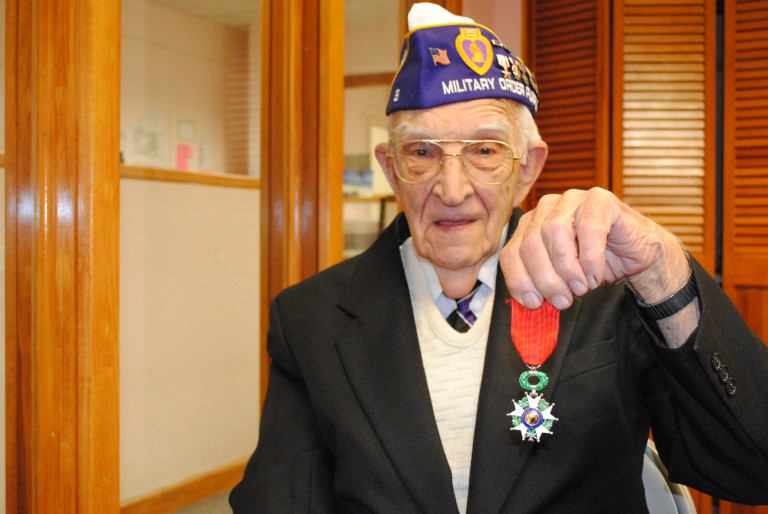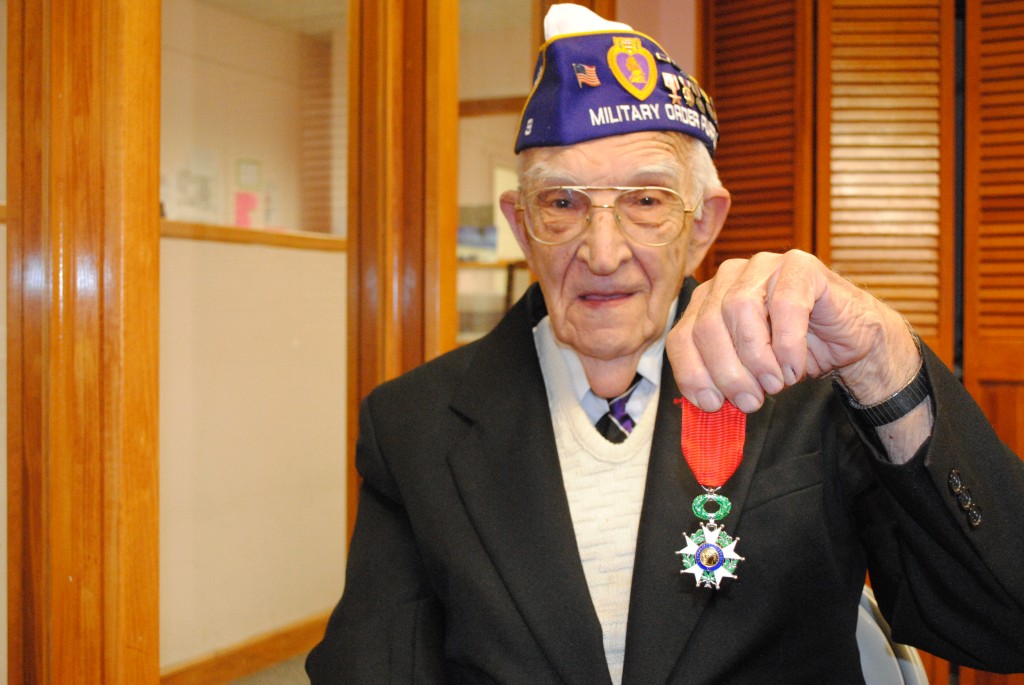If there was one thing that Richmond Hill resident Anton Dietrich, 93, learned while serving on the front lines in Europe and Africa during WWII, it’s the value of serendipity—how things seem to work out for the best.
“It’s an attitude I’ve carried ever since the war,” Dietrich said. With a chuckle, he added, “It especially comes in handy when you get lost on the road driving somewhere.”
Several times during the war, Dietrich faced situations where his life nearly came to a tragic end, only to evade death by good timing, determination and, sometimes, sheer luck. It was that combination that allowed the Queens-born war veteran the chance to not only survive the war, but to be recognized recently for his hand in helping to liberate France by receiving the Knight of the Legion of Honor medal last week in New York.
The medal—France’s highest honor for remarkable deeds—is one of several honors that Dietrich has earned for his service during the war, including a Purple Heart, an American honor given to those wounded or killed during military service. Other honors he has received include the Bronze Star medal, an American Defense medal, a Combat Infantry badge and a Presidential Citation, among others.
Dietrich, who grew up in Richmond Hill, enlisted in the armed services in Oct. 1940. He was at an Army training base, as a member of the 2nd Battalion, 39th Infantry Regiment, 9th Infantry Division, Company G, near South Carolina on Dec. 7, 1941—the day of the Pearl Harbor bombing—when he got word of the attack.
“We were watching a movie when suddenly, the lights went back on, and the P.A. announcer said for all enlisted servicemen to report to the base. I found out what happened a little later and realized, ‘Well, it looks like we’re going to war.’”
From there, Dietrich embarked on a global campaign that took him to Africa and across Europe during the war. Dietrich’s unit was on a battleship, the Thomas Stone, for Operation Torch in Algeria in November 1942 when his vessel was torpedoed by an enemy ship—leaving Dietrich and the rest of his unit stranded on life boats in the Mediterranean for 16 hours.
“It was pretty nerve-racking,” Dietrich said as he looked back on the experience. “We were stranded out in the middle of the sea for hours, and we got lucky that a British ship swung by and picked us up.”
Dietrich later fought in the Tunisia and Sicily campaigns in 1943, and soon enough, he was among the thousands of soldiers that participated in the fourth day of the famous D-Day invasion of Normandy in June 1944, landing on Utah Beach.
Dietrich recalled how—during his combat in France—a mortar shell fatefully landed between near his company while on a mission before it suddenly exploded. Fueled by adrenaline, it wasn’t until he stopped advancing that he noticed something critical: his right arm was nearly blown off.
“I didn’t even feel it,” he said of his injury. “The shrapnel hit my arm, and I felt some of it behind my knee, but I was looking behind me and I saw that it [his arm] was hanging by a thread.”
The injury effectively ended Dietrich’s tour of duty as he was transferred between several medical units and hospitals over the next 32 months—including spending 51 weeks in a body cast—before he was honorably discharged from Walter Reed Army Medical Center in Washington, D.C., after the war in 1947.
During that time, however, Dietrich did manage to marry his then-fiancé, Charlotte, in 1945—during a ceremony performed while he was still in his body cast.
“They even managed to fit the suit right over my cast,” he recalled as he laughed. “They managed to tailor it so that it could fit right over me and I could wear it during the ceremony.”
Dietrich still gets together with surviving members of his battalion on Long Island every year, where the group—which has met for more than 60 years—gets together and discuss everything about their lives.
“They’re like my brothers,” he said of the surviving 10 members of his unit.
Through it all, Dietrich said that his war experiences had taught him the value of keeping his life in a positive perspective—a lesson he credited to one experience while fighting in the Sicilian campaign in 1943.
While going up a mountain in Sicily, he was in the front of the line along with his company. Normally in the back of the marching unit, Dietrich was relocated to the front for that day, for reasons that he did not recall.
It turned out to be a stroke of luck that saved his life, as the Germans—whose ground troops could see the advancing Allied forces—started sending planes in to bomb the unit. Five of the troops that were in the back, where Dietrich would have normally been, were killed during the bombing.
“It was that incident that really started to get me thinking about things happening for a reason,” said Dietrich. “I should have been there, but I wasn’t. And ever since then, I’ve been thinking that way…taking things that are bad at the moment and thinking that maybe something good could come out of it.”
By Jean-Paul Salamanca
jp.salamanca@theforumnewsgroup.com


